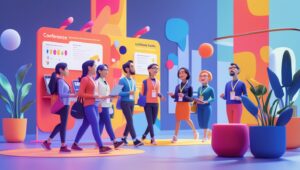How do we make sense of the vast amounts of information shaping our digital world? The answer often lies at the crossroads of research, technology, and collaboration—and that’s exactly what the Information Science Conference offers.
Every year, these events bring together professionals, researchers, thought leaders, and innovators to share knowledge, showcase cutting-edge research, and foster collaborations. Whether you’re a data scientist, academic, or event organizer, attending an information science conference provides unmatched opportunities for growth, visibility, and networking.
What is an Information Science Conference?
An Information Science Conference is a professional gathering focused on the study, application, and innovation of information systems, data management, artificial intelligence, and digital transformation. These events serve as platforms for:
- Presenting academic research and case studies.
- Exploring the impact of AI, big data, and machine learning.
- Discussing cybersecurity, digital ethics, and privacy issues.
- Networking with industry leaders, researchers, and media.
👉 In short, these conferences bridge the gap between academic research and industry application, making them invaluable for professionals at every career stage.
Why Attend an Information Science Conference?
Attending an information science conference is more than just listening to presentations—it’s about shaping the future of technology and knowledge.
Key Benefits for Attendees:
- Networking Opportunities
Meet leading experts, publishers, industry innovators, and fellow researchers. - Knowledge Sharing
Gain exclusive insights into emerging technologies, including AI, quantum computing, and cloud-based information systems. - Career Growth
Present your research, enhance your professional profile, and discover new career opportunities. - Collaboration & Innovation
Conferences often lead to cross-disciplinary projects and innovative breakthroughs. - Visibility for Organizations
For sponsors and exhibitors, conferences provide unmatched exposure to a targeted, high-value audience.
Key Themes at Information Science Conferences
Information science is a dynamic field that evolves quickly. The latest conferences often focus on:
- Artificial Intelligence & Machine Learning – Impact on decision-making and data analysis.
- Data Science & Big Data – Managing massive datasets for business and research.
- Cybersecurity & Privacy – Protecting digital assets in an interconnected world.
- Digital Libraries & Knowledge Management – Preserving, sharing, and curating information.
- Information Ethics – Ensuring responsible use of data and AI.
- Smart Systems & Cloud Computing – Innovations shaping the next decade.
These topics ensure the Information Science Conference remains relevant and forward-looking, appealing to academics, tech professionals, and policymakers alike.
Who Should Attend?
The target audience for an Information Science Conference is diverse yet interconnected:
- Professionals & Industry Experts: Stay ahead of market trends and technology adoption.
- Event Organizers & Planners: Curate impactful conferences with global reach.
- Academics & Researchers: Publish papers, present findings, and connect with peers.
- Speakers & Thought Leaders: Showcase expertise and influence industry directions.
- Journalists, Bloggers & Media: Cover emerging stories and share key takeaways.
👉 Whether you’re attending for professional growth or academic collaboration, these events are built for high-value engagement.
Top Global Information Science Conferences to Watch
Here are some of the most anticipated Information Science Conferences:
- International Conference on Information Systems (ICIS)
- Focus: Information systems, data management, and AI applications.
- Audience: Academics, researchers, and corporate leaders.
- ACM/IEEE Joint Conference on Digital Libraries (JCDL)
- Focus: Digital archives, big data, and digital knowledge systems.
- Audience: Librarians, scholars, and IT experts.
- World Conference on Information Security & Data Science
- Focus: Cybersecurity, privacy, and data-driven decision-making.
- Audience: Cybersecurity professionals, policymakers, and IT managers.
- Global Information Systems & Technology Summit
- Focus: Business intelligence, enterprise systems, and IT innovation.
- Audience: Business executives, entrepreneurs, and IT consultants.
Tips for Making the Most of Your Conference Experience
Attending a conference is an investment. Here’s how to maximize it:
- Plan Ahead: Review the agenda, speakers, and workshops.
- Network Strategically: Use LinkedIn, conference apps, and Q&A sessions to connect.
- Take Notes: Document insights and key takeaways for future reference.
- Ask Questions: Engage with speakers to build visibility.
- Follow Up: Send post-conference emails or connect on social platforms to maintain relationships.
FAQs About Information Science Conferences
1. What is the focus of an Information Science Conference?
It focuses on data science, information systems, AI, cybersecurity, and knowledge management.
2. Who can attend these conferences?
Academics, industry experts, event planners, tech professionals, and students are welcome.
3. Do I need to present research to attend?
No. While many attendees present papers, conferences also welcome general participants.
4. How can I find upcoming Information Science Conferences?
Check academic portals, industry event directories, or sites like Conferences Daily.
5. What are the benefits of attending?
Networking, learning emerging trends, career opportunities, and exposure to new research.
Conclusion: Shape the Future of Information Science
The Information Science Conference is more than just an event—it’s a platform for innovation, collaboration, and growth. Whether you’re an academic researcher, industry expert, or thought leader, these conferences provide unmatched opportunities to network, learn, and lead in the evolving world of information.
👉 Ready to take the next step?
Join the global community of innovators by exploring upcoming events at Conferences Daily.















